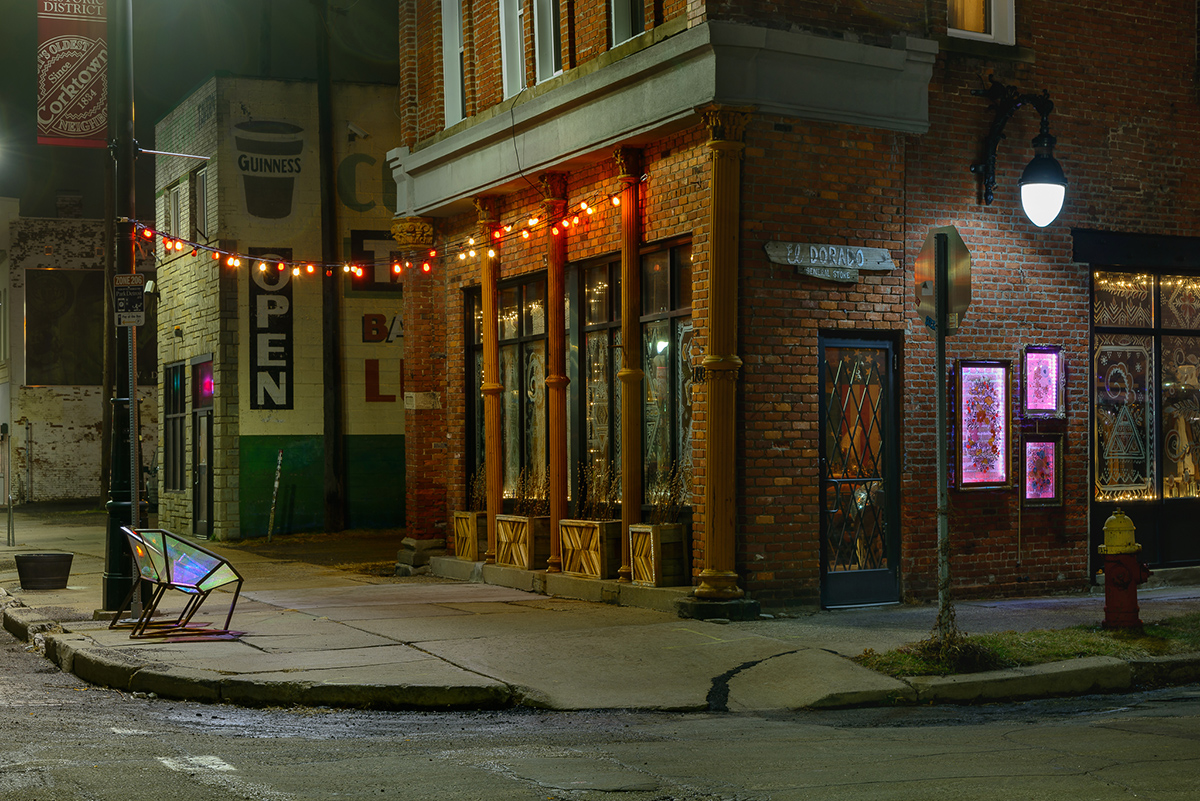
How Detroit’s People First Project uses culture to shape urban development
The People First Project is helping to revitalize Corktown, one of Detroit’s oldest neighborhoods, by leveraging a 2016 Knight Cities Challenge grant to create a series of temporary changes along the busy Michigan Avenue corridor. The ideas help people better connect with public space, while promoting collaboration among the city’s creatives and urban innovators.
“One goal of the People First Project was to see how this method of city making could transform Michigan Avenue,” said founder Chad Rochkind, “but another goal was to build local capacity and understanding about alternative methods. … I think it’s important for the people to assert themselves in the shaping of public life.”
Rochkind, founder of Human Scale Studio, a consultancy that helps reshape the urban environment to better serve people, credits experiences in San Francisco, New York and London with helping inspire the idea.
“A common thread between all those cities is a coherent urban fabric of walkable streets and parks and other public spaces,” he said. “Spaces where people can linger, explore, get lost, daydream… It’s the serendipity of public life that makes cities so enthralling, and ultimately leads to their economic and cultural strength.”
While working on his master’s thesis at New York University, Rochkind coined the term “alterurbanism” to describe the confluence of a new generation of artists, urban planners, architects and regular neighborhood folks recognizing the power of intervention in public spaces. He launched his theory into action in Detroit, beginning with a parklet in front of Astro Coffee, which was funded by a $5,000 mini grant through the K880 Emerging City Champions Fellowship program.
The parklet ignited a conversation about the future of the street, and Rochkind applied to the Knight Cities Challenge to scale the idea and create a hyperlocal fellowship model. After winning, the People First Project issued a call for proposals and last summer awarded 12 people $5,000 each for projects to make Michigan Avenue more people-friendly. They also received mentorship from world-class leaders in tactical urbanism, human-centered design, storytelling, visioning and other skills that should be in every city builder’s toolkit.
Many of the projects debuted at the inaugural Open Streets Detroit event, which took place last year on Sept. 25 and Oct. 2. The sprawling event provided a free, safe and inclusive opportunity for fitness, recreation and community building, opening nearly 4 miles of continuous roadway to people to experience the streets in a new way. There were also complementary activities, such as yoga, dancing, basketball and other health and wellness activities at locations along the route.
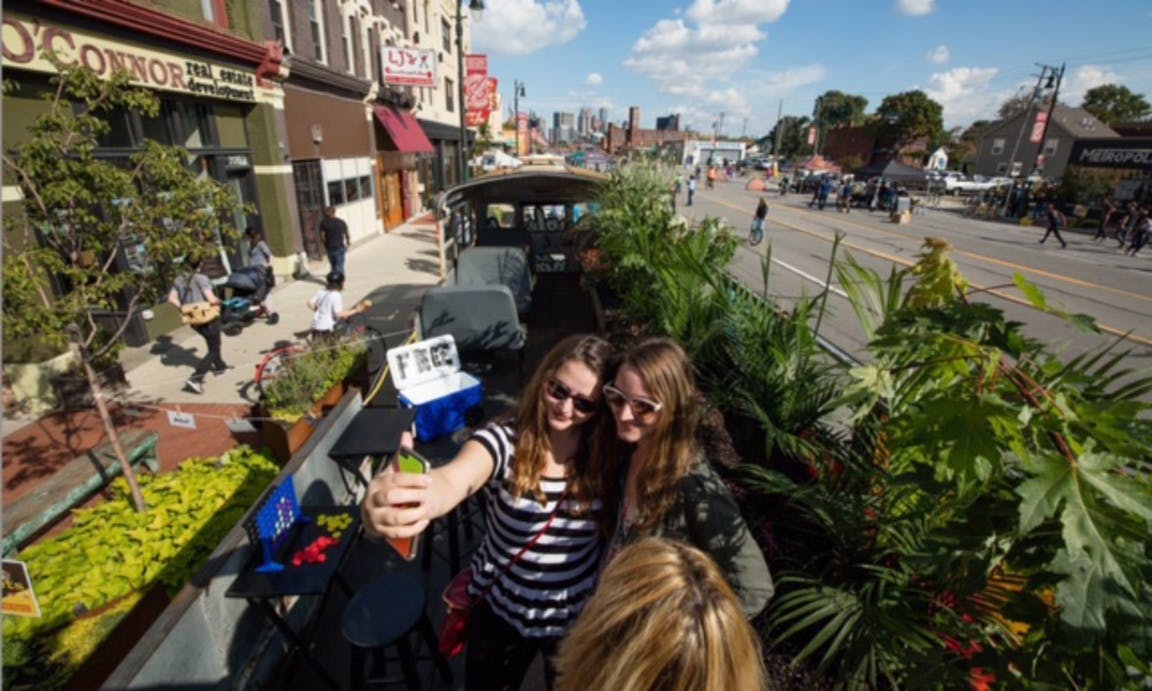
One such site was Greg Mangan’s Bus Parklet, a former school bus donated by the owner of the Detroit Bus Co., Andy Didorosi, that was converted into a parklet and towed into a parking spot in front of Astro Coffee for the Open Streets events. The bus was radically converted by local welder Ben Wolf and his team, and decorated by Southwest Detroit artist Freddy Diaz, with a mural displaying Detroit pride and giving a shoutout to the People First Project. Sit On It Detroit created chess and checkerboard tables made of reclaimed wood from a former Detroit gym floor, which were stationed between the reconfigured bus seats. Planter boxes created by Wolf were filled with ferns, ornamental grasses and flowers to provide a parklike setting within the box.
“I thought that converting a bus into a parklet and placing it in a parking space could help inspire people to reimagine the uses of streets and roads,” said Mangan. “The bus parklet narrowed the road by placing it into the parking space along the curb, with the intention of slowing traffic and thus providing a fun, relaxing space that would transition pedestrian space from the storefront tot he sidewalk and then into the street.”
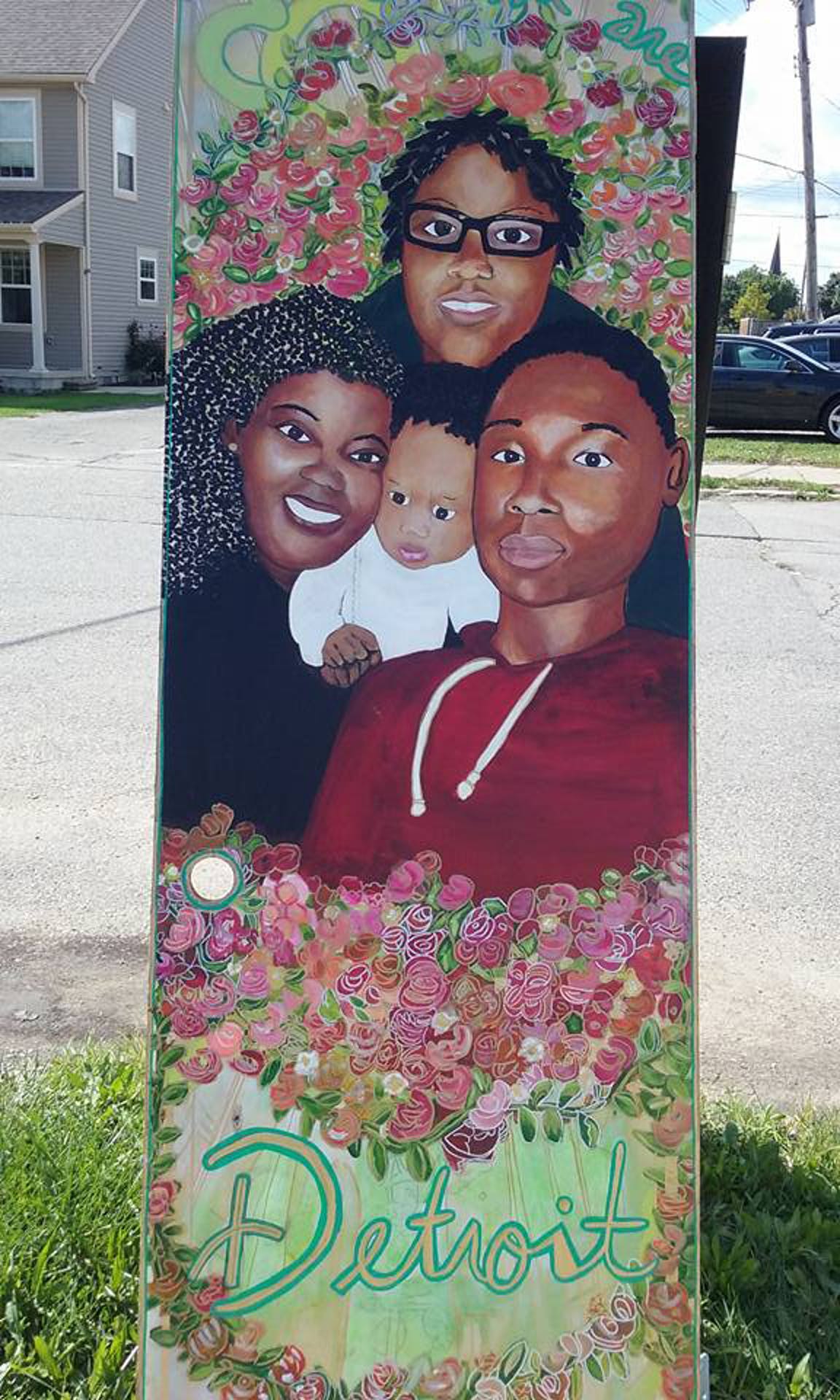
Donna Jackson created a proposal for a public art installation called “Doors of Opportunity,” which had a soft opening during Open Streets. The collection of doors was transformed by local artists, with the purpose of making art accessible to people by bringing works into their neighborhoods and public spaces.
“With People First, I envision using the doors not only as art but to create intimate space for people to gather in and enjoy,” said Jackson. “[The doors are] creating boundaries in a space that is underused.” Jackson said that one of the unforeseen challenges of the project has been getting permission to temporarily install the exhibit in locations on Michigan Avenue.
“This is the first time I am working in a neighborhood where I do not have a direct connections or relationships with someone, so getting a yes has been more difficult,” she said. “I have not yet created what I envisioned on Michigan Avenue, but I continue to reach out, talk to community members, knowing I will get a yes soon.”
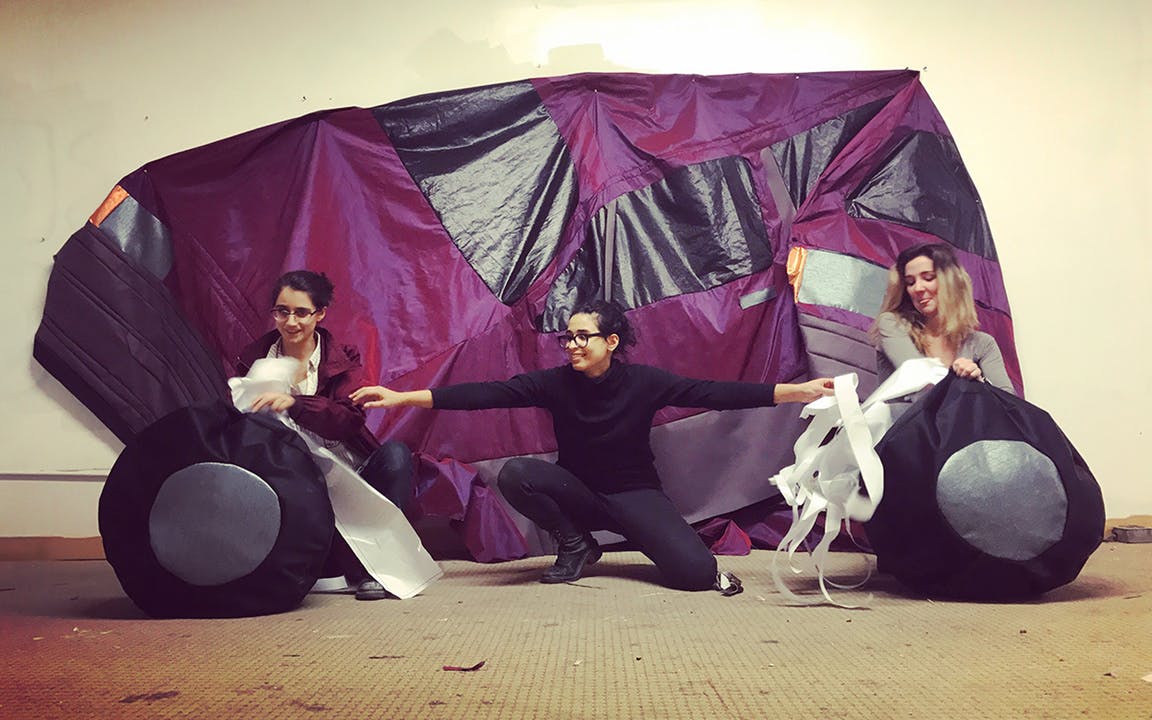
As is perhaps to be expected in the Motor City, a number of the projects dealt with cars, including a work by Samantha Okolita and Salam Rida titled “SoftCar.”
“I was inspired by Chad’s interest in developing more pedestrian-friendly initiatives within the city,” said Rida. “For the second round I asked Sam Okolita to collaborate in designing another proposal.” “SoftCar” is a to-scale 1984 Ford Fiesta sewn out of a patchwork of vibrant fabrics, and filled with recycled foam that rests on a concealed wooden frame.
“We wanted to design something both playful and critical of the way streets are used today,” said Okolita. “We wanted to create an image of something innovative and achievable that inspires others to think outside the box of what a public installation might be or look like.”
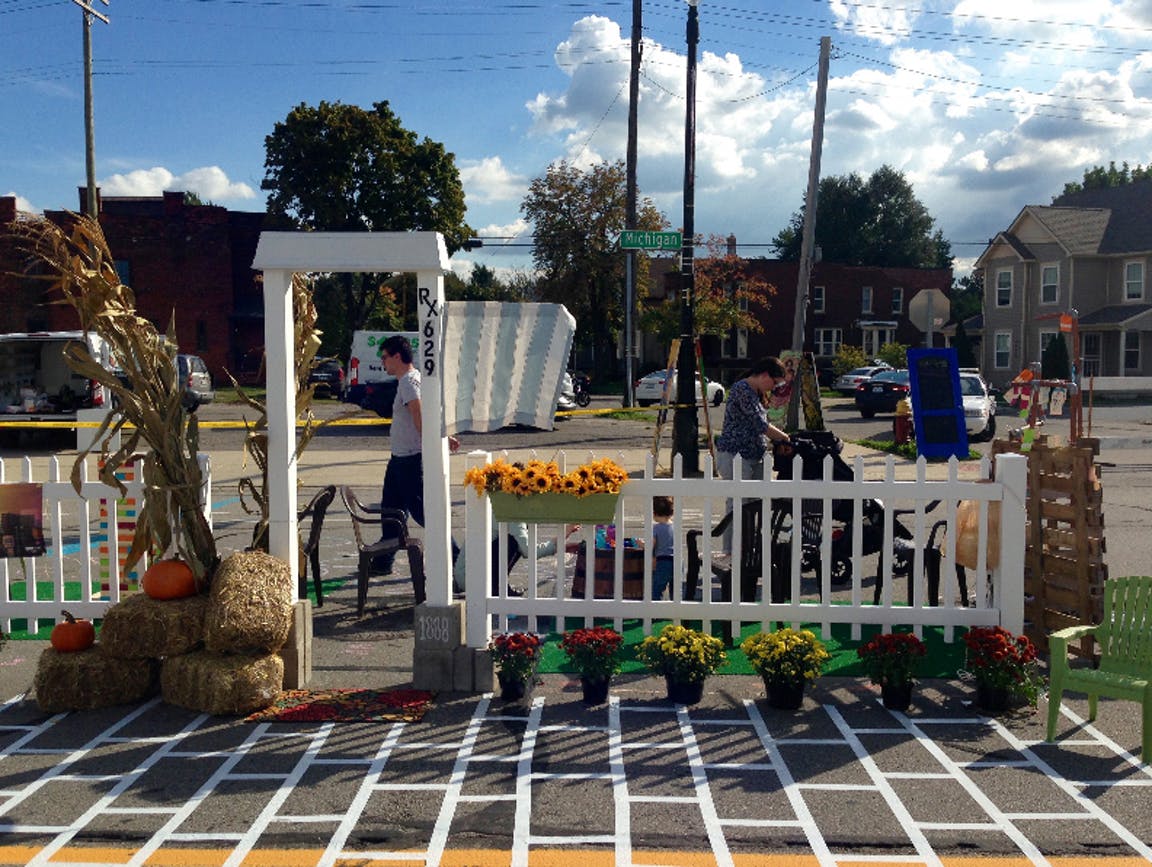
Other projects focused on the history of Corktown. The area was first settled in the 19th century by immigrants from County Cork, Ireland, and has experienced waves of change as the city’s demographic makeup and economic fortunes have shifted. Mikayla Cutlip’s Historic Footprint project sought to recreate a historic street scene, and wound up gathering anecdotes about the hidden history of Corktown from longtime residents and passersby.
“In the late 1930s, buildings on the south side of Michigan Avenue were demolished to expand the road,” said Cutlip. “I proposed taking a step back in history by recreating a portion of these original buildings. The goal of this project was to rescale the street to its pre-expansion width—about half of what it is currently. When thinking about creating a complete street that’s more geared toward putting people first, I saw value in experiencing the avenue at a different scale, and all the better that it had already existed and could be rooted in historic context.” For Open Streets, Cutlip’s team set up and occupied the original footprint of Hungerford Drugstore, and popped up building elements that helped visitors feel what the space and streetscape once was.
“This adjacency of the past, present and future gave us historic context for feeling and discussing development,” said Cutlip. “Similarly, this build-out served as a live example of tactical urbanism, and hopefully worked toward engaging more people in the process. Ultimately, we began to answer: How does experiencing echoes of Detroit’s past allow us to better understand what the city was and project where it is going?”
The People First Project continues through April and later this year plans to debut a website that will profile each project, document its journey, and provide resources for other aspiring tactical urbanists.
Rosie Sharp is a Detroit-based freelance writer and artist. Email her via [email protected] and learn more at sarahrosesharp.com.
Recent Content
-
Community Impactarticle ·
-
Community Impactarticle ·
-
Community Impactarticle ·


